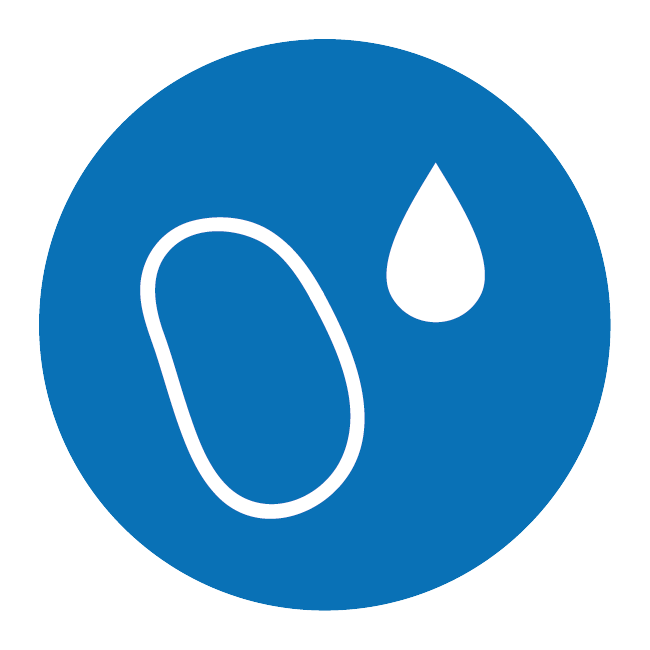Hard water cations can lock-up pesticides
Hard water cations can lock-up pesticides preventing uptake in plants. Once locked-up, the process is irreversible and the performance of your pesticide will be significantly reduced.
Making up 95% of the spray solution you apply to your field, it should be no surprise that hard water can have a significant impact on the performance of the products you put in to it.
Using hard water to prepare tank mixes can significantly reduce the performance of your crop protection programme and you should look to correct it if using susceptible active ingredients.
Hard water is a problem, especially in the main arable areas. Water samples commonly exceed 300ppm of calcium carbonate equivalent. This could easily deny you 30% of a pesticide’s potential activity and will have implications for resistance, and follow up treatment that will eat into profits if left uncorrected.
Potential impact of hard water
- Poor uptake by the plant, and poor performance overall
- At 1,000 ppm – very hard water – loss in efficacy can be as high as 30%
- Poor performance has implications for resistance
- Repeat treatment may be required, but correct hard water first
What is hard water?
Hard water is water that has high mineral content.
Hard water is formed when water percolates through deposits of limestone, chalk or gypsum, which are largely made up of calcium and magnesium carbonates, bicarbonates and sulphates.
Water hardness is a measure of divalent metal cations. The divalent calcium and magnesium cations dissolved in water, are the two most common minerals that make water hard.
Water is considered hard if it has 200 ppm (parts per million) or more of these positively charged cation minerals, but readings of over 1,000 ppm are not uncommon in some areas of England.


Hard water cations can lock-up pesticides, preventing uptake
In water crop protection active ingredients which are weak acids partly dissociate – they become negatively charged anions. Dissolved calcium and magnesium cations lock on to crop protection anions and form insoluble complexes which are then too big to be absorbed by plants. This has serious implications because once bound, crop protection molecules are permanently locked-up and cannot perform their function. Reduction in pesticide effectiveness can be significant.
How much is locked up depends on:
- Water hardness – at 1,000 ppm, very hard water, loss in efficacy can be as high as 30%
- pH – At high pH (e.g. pH8) even more can be bound by a single cation molecule because more of the active ingredient dissociates
Could hard water be reducing the effectiveness of your pesticides?
Many pesticides are susceptible to the lock-up process, including:
- Graminicides (sulfonyl-ureas, dims and ALS inhibitors)
- Blight fungicides
- Some PGRs, insecticides and glyphosate
You can check which pesticides dissociate in water and are therefore at risk from hard water, by its pKa value.
Actives with a pKa value of 3-6 are considered weak acids and are at significant risk of lock-up in hard water. You can see some of the common ones in the table or you search other actives here.


As both water hardness and pH impact pesticide performance, you should test for both.
Your water source will determine how hard it is
Water source has a huge effect on water hardness, so it is advisable to sample the water source you use for spraying to find out if it is soft, hard or very hard. Water should be soft to maximise active ingredient availability to plants / pests.
Rain water – should offer good spray water. It will be ”soft” and the pH will be around 5.5 (slightly acidic). Rain water is acidic because as it passes through the atmosphere, it mixes with carbon dioxide and creates carbonic acid.
Tap water – is very variable across the UK so should be tested for hardness and pH.
Bore hole water – taken from depth, bore water is usually considered hard due to being in contact with cationic elements, which in turn increases pH.
You should test your spray water to find out if it is hard or soft
As hard water can lead to such a big reduction in pesticide effectiveness, you should test the water you use for spraying.
You can easily test the water with home testing strips.
For better accuracy you can invest in a conductivity meter which measures total dissolved solids for water hardness, and an electronic pH meter for measuring acidity.
For a regular source, it’s worth sending a sample to the lab. It will be more accurate and cheaper than buying expensive gadgets.

A Water Conditioner will prevent hard water cations locking-up your pesticides


Is hard water and high pH causing havoc with your tank mixes? If it is, you’ll need to condition hard water and correct pH with a water conditioner to maximise pesticide effectiveness.
Learn more








